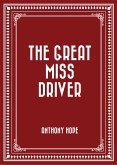In "The Great Miss Driver," Anthony Hope masterfully weaves a narrative that delves into the intricacies of societal norms and personal aspiration in the late Victorian era. The story follows the titular character, Miss Driver, who defies conventional expectations of womanhood through her keen intellect and indomitable spirit. Hope employs a satirical yet poignant literary style, intertwining sharp wit and emotional depth, which reflects the broader context of a society grappling with the changing roles of women. The engaging prose captures the tension between tradition and progress, making the reader contemplate the implications of individual choices against the backdrop of societal pressure. Anthony Hope, renowned for his earlier work "The Prisoner of Zenda," skillfully channels his experiences as a playwright and novelist into "The Great Miss Driver." Having observed the shifting currents of his time, Hope'Äôs writing showcases his deep understanding of character development and social commentary. His connection to the world of theatre undoubtedly informs the spirited dialogue and dynamic character interactions that propel the narrative forward. This novel is a compelling recommendation for readers interested in early feminist literature and the literary exploration of gender dynamics. Hope's incisive prose and rich commentary on societal expectations invite both enjoyment and reflection, making it an essential addition to any literary collection.
Dieser Download kann aus rechtlichen Gründen nur mit Rechnungsadresse in A, B, BG, CY, CZ, D, DK, EW, E, FIN, F, GR, H, IRL, I, LT, L, LR, M, NL, PL, P, R, S, SLO, SK ausgeliefert werden.









